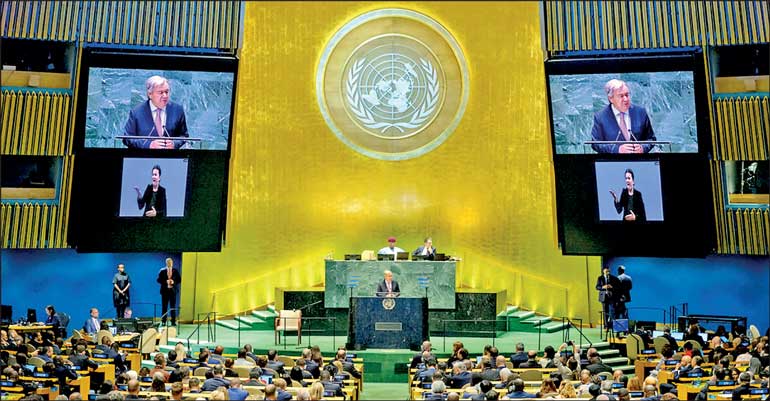Tuesday Feb 17, 2026
Tuesday Feb 17, 2026
Saturday, 12 October 2024 00:10 - - {{hitsCtrl.values.hits}}

Opening of the Summit of the Future by the UN Secretary-General – Credits: UN Photo/Loey Felipe
 The global community stands at a critical juncture, as countries around the world are facing escalating climate impacts, environmental challenges, economic disparities, and the need for sustainable development. After the first overarching progress assessment under the Paris Agreement and the recent Summit of the Future, are we steering the correct course? With the end of this decade rapidly approaching, there is an urgent need to develop a vision for the future that goes beyond 2030 and unifies climate action, sustainable development, and a reconfiguration of the global financial architecture.
The global community stands at a critical juncture, as countries around the world are facing escalating climate impacts, environmental challenges, economic disparities, and the need for sustainable development. After the first overarching progress assessment under the Paris Agreement and the recent Summit of the Future, are we steering the correct course? With the end of this decade rapidly approaching, there is an urgent need to develop a vision for the future that goes beyond 2030 and unifies climate action, sustainable development, and a reconfiguration of the global financial architecture.
The Summit of the Future
After years of preparation, the United Nations’ Summit of the Future took place last month from 22 to 23 September 2024. Billed as a once-in-a-generation high-level event, the Summit brought together world leaders and non-governmental actors in New York City to adopt a Pact for the Future, including a Global Digital Compact and a Declaration on Future Generations. This Pact aims to update global governance for the realities of today and the challenges of tomorrow, building on the United Nations Secretary-General’s statement that “we cannot create a future fit for our grandchildren with a system built by our grandparents.”
The Pact for the Future covers a wide range of topics from peace and security to sustainable development, climate action, and the global financial system. Youth and future generations are highlighted as key actors and stakeholders, and a Global Digital Compact is annexed as “the first comprehensive global framework for digital cooperation and AI governance.” As an overarching commitment, the Pact pledges to “reinvigorate global action to ensure the future we want and to effectively respond to current and future challenges, in partnership with all relevant stakeholders.”
A Decade of Action
In 2015, the world decided on the Paris Agreement on climate change as well as sixteen Sustainable Development Goals (SDGs). Under the 2030 Agenda for Sustainable Development, the SDGs are supposed to be achieved by 2030, a process that is supposed to be accelerated during the “Decade of Action” from 2020 to 2030. Similarly, implementation of the Paris Agreement has begun in 2020, with Parties due to update their respective contributions (the Nationally Determined Contributions or NDCs) by early 2025, ahead of the global climate change conference end in Belém, Brazil. These NDCs should be informed by the first Global Stocktake, an assessment of the state of global climate action that was finalised and adopted by all Parties at the end of 2023.
Both the Pact for the Future and the Global Stocktake highlight the “current slow pace of progress in addressing climate change” and find that the world is “not yet collectively on track towards achieving the purpose of the Paris Agreement and its long-term goals.” Climate action needs to be scaled up in this critical decade, including through the provision and mobilisation of finance, enhanced international cooperation, and science, technology, and innovation.
Climate-vulnerable developing countries, including Sri Lanka, are at the forefront of climate change and exposed to some of the most direct and dangerous impacts. At the same time, they are often facing increasing macroeconomic challenges, constraints, and debt distress, further limiting their fiscal space and the ability to engage in long-term planning. The current global financial architecture has been criticised for its inadequacies in addressing these issues, and. There is a growing call to restructure this architecture to be more equitable and supportive of sustainable development, aligning with principles of climate justice and international cooperation.
Both the Global Stocktake and the Pact for the Future take up this call for accelerated financial system reform to meet the urgent challenge of climate change, allow countries to borrow sustainably for their development, and create “a world free of poverty on a liveable planet.” As outlined in these documents as well as several recent reform proposals—such as the Bridgetown Agenda 3.0, the CVF/V20 Accra-Marrakech Agenda, or the Paris Pact for People and Planet—, this includes greater access to climate finance for developing countries, new visions for multilateral development banks, and innovative financial instruments such as climate-resilient debt clauses, blue bonds, or debt-for-climate swaps.
Changing systems and the need for transformation
How can we envision the future of global climate action and sustainable development, and what does that mean for developing countries such as Sri Lanka? The SDGs and the Paris Agreement have been pivotal in shaping global efforts toward sustainability and climate action: but the SDG target year of 2030 is approaching quickly, and more ambitious action is required to keep the goals of the Paris Agreement within reach.
Foresight-driven planning involves anticipating future challenges and opportunities, enabling policymakers to develop proactive and effective strategies while accounting for uncertainties and emerging risks. In this context, concepts such as transformative adaptation or long-term resilience are gaining prominence, although it remains ambiguous how exactly to define and operationalise them.
Fostering transformative adaptation and long-term resilience requires systemic and whole-of-society approaches. Implementing individual actions or technologies—for example, building flood defences or shifting to renewable energies—is important, but there is also a need for a deeper systemic change that considers all actors across the various value chains as well as the socioeconomic ecosystem that in which they operate. These approaches would go beyond incremental adjustments and seek to alter the underlying social, economic, and environmental frameworks to address root causes of vulnerability and empower systems and institutions to dynamically respond to the challenges of tomorrow.
(The writer works as Director: Research & Knowledge Management at SLYCAN Trust, a non-profit think tank based in Sri Lanka. His work focuses on climate change, adaptation, resilience, ecosystem conservation, just transition, human mobility, and a range of related issues. He holds a Master’s degree in Education from the University of Cologne, Germany and is a regular contributor to several international and local media outlets.)